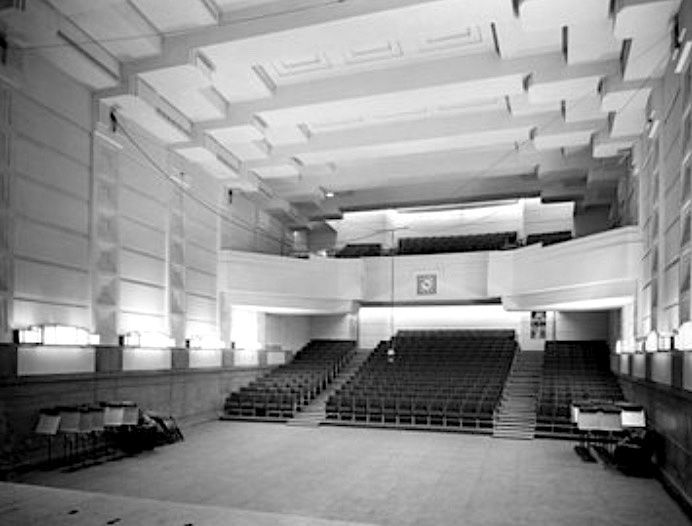OTD in early British television: 26 June 1939

John Wyver writes: At twenty-past-four on Monday 26 June 1939, just two months before war was declared, Grace Wyndham Goldie showed her green ticket to gain access to Broadcasting House’s Concert Hall (above, in 1932, soon after its opening).
The occasion was billed as a Television Tea Party, to which lookers-in had been invited to listen to and interrogate director of television Gerald Cock. Some 700 set owners had requested a ticket, and from his office wastebasket Cock had drawn 75 names, each to be accompanied by a plus-one.
Filled with curiosity about these viewers, Wyndham Goldie had an early encounter with a dealer who explained that,
The trouble is that the people who can afford sets aren’t the ones who want them… It’s the people who can afford five shillings a week I could sell most of my sets to. There’s your real television public.
Canvassing other opinions, the Listener critic spoke with
a quiet couple from Ilford who always asked their neighbours in to see the programmes. I met another couple who bought their set with ever having seen a programme at all. I met a mother and daughter from Epsom who said that the thing they liked best about television was that it was so different from the film.
There is a sense of charming naivety to these encounters, which was almost certainly shared by the production staff who attended that afternoon. Before this, they had comparatively little sense, beyond family and friends, of viewers or their views on television. Pre-war audience research at the BBC was still in what the pioneering statistician R.J.E. Silvey described as its ‘years of experiment’.
Present at the Tea Party were announcers Jasmine Bligh, Elizabeth Cowell and Leslie Mitchell, as well as BBC director-general Frederick Ogilvie and controller of public relations Stephen Tallents. After everyone had enjoyed a cuppa, Cock was peppered with questions and suggestions, including
- Picture Page is ‘too rushed’
- Sound programmes should be used to promote television
- Famous old films like Birth of a Nation should be revived [although perhaps not the abhorently racist ones]
- More glamour is needed in the programmes
- There is a great demand for special children’s programmes
- Announcers should be seen more
- More plays are wanted
- Evening programmes should start earlier.
The Guardian noted that Cock mostly responded with ‘a recital of difficulties, such as lack of money, studio accommodation, staff. and various technical difficulties.’ But as the Times reported, Tallents
wound up the conference, which left the impression that viewers are satisfied with the programmes and that Mr. Cock has succeeded in providing an all-round service which caters for every taste.
Grace Wyndham Goldie too came away from the Television Tea Party much heartened by her encounter with living and breathing viewers. Overall, they liked the programmes, and were willing to tolerate any problems.
They were also very enthusiastic about the announcers, reinforcing her sense that the attraction of television was the direct and intimate address previously established by radio, in contrast to what she characterised as ‘the oblique large-audience appeal of stage and film’.
And she was surprised, but also delighted, that the audience was
ready for television to develop into something on its own, to be different from the stage and from the film… They don’t want it just to be a means of transmission. They are prepared to see it become a new medium.
She recognised that much of this could have been gleaned from the questionnaires that the Television service had recently issued.
But the party was fun for viewers. And very good, I’m sure, for Alexandra Palace. When l was in one of the Regional Broadcasting stations last winter I remarked that the people there had an outlook upon broadcasting problems which was curiously different from the one I was accustomed to hear.
The man I was speaking to laughed and said: ‘Well.some of us up here do occasionally see a listener’. l think it makes a difference. And I believe it will make a difference that the staff of Alexandra Palace saw, last Monday afternoon, a hundred-and-fifty viewers.
[OTD post no. 191; part of a long-running series leading up to the publication of my book Magic Rays of Light: The Early Years of Television in Britain in January 2026.]
Leave a Reply